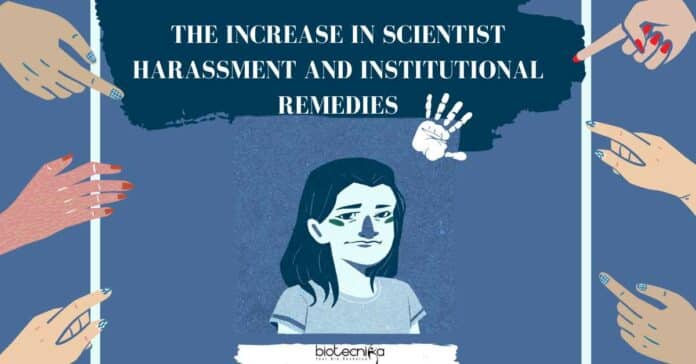Scientist Harassment In Professional Settings
Scientists are increasingly being harassed online and in professional settings. This has become a serious problem in recent years. Institutions frequently find it difficult to properly support and safeguard their researchers. Despite increased awareness, the nature of harassment of scientists is still a major concern.
Nature of Harassment
Scientists can be bullied in a number of ways such as through sexual harassment, gender-based, discrimination based on race and bullying in the workplace. Online harassment has been rising, especially on social media where professionals who support public health campaigns are targeted by threats.
Table of Contents
Online Harassment
Online harassment has grown as part of the COVID-19 pandemic. Two-thirds of doctors and biomedical scientists said they had been the victim of harassment on social media, according to research. These attacks tend to be caused by issues related to vaccinations, mask laws and reproductive rights. Stress, anxiety and burnout are among the mental health effects on affected scientists. And some of them opt to cut back their online presence in spite of how crucial it is for public communication.
Sexual Harassment
In scientific professions, sexual harassment is still commonplace. Based on reports, many female scientists report experiencing sexual harassment in educational institutions and when conducting fieldwork. The systemic nature of the issue and the challenge of holding culprits accountable are disclosed by high-profile cases.
Racial and Gender-Based Discrimination
Discrimination based on race and gender adds much more difficulty. For instance, compared to their white counterparts, black scientists report more cases of harassment. Women and those who consider themselves gender nonconforming are disproportionately targeted, making their career challenges harsher.
Institutional Challenges
To deal with sexual harassment, institutions have to tackle many challenges. These include scarcity of resources, inadequate policy, and concern over damaging one’s reputation. While there has been some progress—for example, changes to policies permitting the expulsion of harassers from professional associations—more comprehensive and unified processes are still required.
Policy and Cultural Barriers
Policies that adequately protect scientists are challenging to institutions to develop and execute. It was only recently that the National Academy of Sciences modified its statutes to permit the termination of members for harassment. Nevertheless, this change illustrates how slowly entities are reforming.
Resource Limitations
Numerous groups lack the funding necessary to put strong anti-harassment campaigns into force. Financial backing, skilled labour and a persistent commitment are essential for effective support systems but these are frequently deficient.
Reputational damage fear
Institutions may be hesitant to act aggressively out of fear of harming their institution’s reputation. Reports of harassment are rarely ever made public because individuals are reluctant to risk bad press and possible retribution. This silence serves to maintain a culture in which harassment goes unnoticed and unchecked.
Impact on Scientists
Scientists are particularly susceptible to the adverse impacts of harassment on their personal safety, advancement in their jobs, and mental health. A decline in job happiness and productivity appears in scientists who report feeling alone and unsupported.
Mental Health
Significant mental health issues are linked with harassment among scientists. It’s organic to experience anxiety, worry and despair. Some people might think about quitting their job. For those who experience ongoing harassment both online and offline. Psychological consequences may be extremely detrimental.
Career Progression
Job advancement can be impeded by harassment, particularly for early-career scientists and members of underrepresented groups. The issue could deteriorate by preventing victims from reporting instances out of fear of retaliation or not being taken seriously.
Personal Safety
Harassment frequently escalates into threats against an individual’s safety. Scientists who advocate for the public, particularly on contentious issues like vaccinations or climate change often face threats of death and other forms of intimidation. That forces them to take protection precautions for their families and themselves.
Institutional Responses and Solutions
Institutions have to take all-encompassing measures that tackle the practical, cultural, and policy aspects related to the issue in order to effectively combat harassment.
Strengthening Policies
Implementing explicit, enforceable laws that identify harassment and specify the penalties for perpetrators is essential for institutions. In order to take into consideration new issues and best practices, these policies should be regularly reviewed and updated.
Building Support Systems
Implementing strong support networks for victims is necessary. This includes providing access to safe reporting channels, legal support and counseling services. Institutions ought to set up separate divisions to deal with harassment complaints tactfully.
Promoting a Culture of Respect
Harassment can be minimized in scientific communities by promoting a respectful atmosphere. Regular workshops on polite behavior would help. Also training programs on diversity, equality and inclusion can help generate an improved workplace environment.
Ensuring Accountability
Building trust takes transparency as well as accountability. Publicly committing to combating harassment while offering regular updates on their efforts are important for institutions. Irrespective of their standing, harsh punishment is necessary to avoid similar transgressions in the future.
Conclusion
Institutions must move swiftly to address the increasing problem of scientist harassment. Institutions may better protect their researchers and promote safety. And also a more inclusive scientific community by fortifying policies, establishing strong support networks, encouraging a culture of respect and guaranteeing accountability. The integrity and progress of science as a whole as well as the happiness of individual scientists are all dependent on fixing this issue.
Scientist Harassment In Professional Settings






























